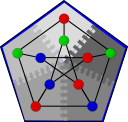 Boost
C++ Libraries
Boost
C++ Libraries
...one of the most highly
regarded and expertly designed C++ library projects in the
world.
— Herb Sutter and Andrei
Alexandrescu, C++
Coding Standards
 Boost
C++ Libraries
Boost
C++ Libraries
...one of the most highly
regarded and expertly designed C++ library projects in the
world.
— Herb Sutter and Andrei
Alexandrescu, C++
Coding Standards
 Vertex List Graph Adaptor
Vertex List Graph Adaptor
template<typename Graph, typename GlobalIndexMap>
class vertex_list_adaptor
{
public:
vertex_list_adaptor(const Graph& g,
const GlobalIndexMap& index_map = GlobalIndexMap());
};
template<typename Graph, typename GlobalIndexMap>
vertex_list_adaptor<Graph, GlobalIndexMap>
make_vertex_list_adaptor(const Graph& g, const GlobalIndexMap& index_map);
template<typename Graph>
vertex_list_adaptor<Graph, *unspecified*>
make_vertex_list_adaptor(const Graph& g);
The vertex list graph adaptor adapts any model of Distributed Vertex List Graph in a Vertex List Graph. In the former type of graph, the set of vertices is distributed across the process group, so no process has access to all vertices. In the latter type of graph, however, every process has access to every vertex in the graph. This is required by some distributed algorithms, such as the implementations of Minimum spanning tree algorithms.
Contents
<boost/graph/distributed/vertex_list_adaptor.hpp>
The vertex_list_adaptor class template takes a Distributed Vertex List Graph and a mapping from vertex descriptors to global vertex indices, which must be in the range [0, n), where n is the number of vertices in the entire graph. The mapping is a Readable Property Map whose key type is a vertex descriptor.
The vertex list adaptor stores only a reference to the underlying graph, forwarding all operations not related to the vertex list on to the underlying graph. For instance, if the underlying graph models Adjacency Graph, then the adaptor will also model Adjacency Graph. Note, however, that no modifications to the underlying graph can occur through the vertex list adaptor. Modifications made to the underlying graph directly will be reflected in the vertex list adaptor, but modifications that add or remove vertices invalidate the vertex list adaptor. Additionally, the vertex list adaptor provides access to the global index map via the vertex_index property.
On construction, the vertex list adaptor performs an all-gather operation to create a list of all vertices in the graph within each process. It is this list that is accessed via vertices and the length of this list that is accessed via num_vertices. Due to the all-gather operation, the creation of this adaptor is a collective operation.
These function templates construct a vertex list adaptor from a graph and, optionally, a property map that maps vertices to global index numbers.
A Distributed property map whose type must model Readable property map that maps from vertices to a global index. If provided, this map must be initialized prior to be passed to the vertex list adaptor.
Default: A property map of unspecified type constructed from a distributed iterator_property_map that uses the vertex_index property map of the underlying graph and a vector of vertices_size_type.
These operations require O(n) time, where n is the number of vertices in the graph, and O(n) communication per node in the BSP model.
Copyright (C) 2004 The Trustees of Indiana University.
Authors: Douglas Gregor and Andrew Lumsdaine